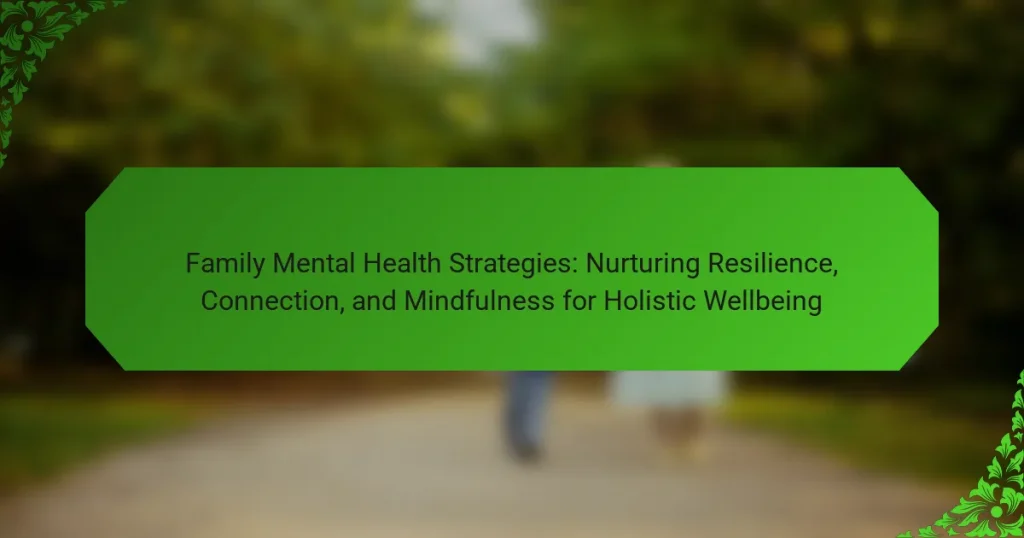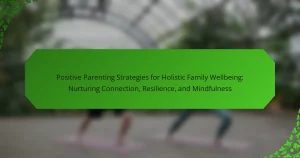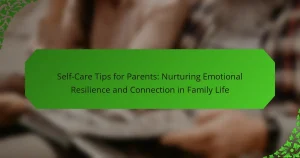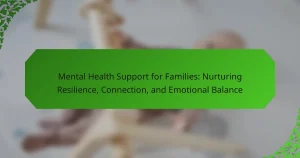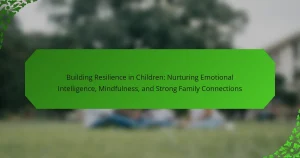Enhancing family mental health is essential for fostering resilience, connection, and mindfulness. This article explores strategies like open communication, shared activities, and mindfulness practices. It emphasizes the importance of establishing routines and emotional expression. Additionally, it highlights unique approaches such as intergenerational communication and community engagement for holistic wellbeing.
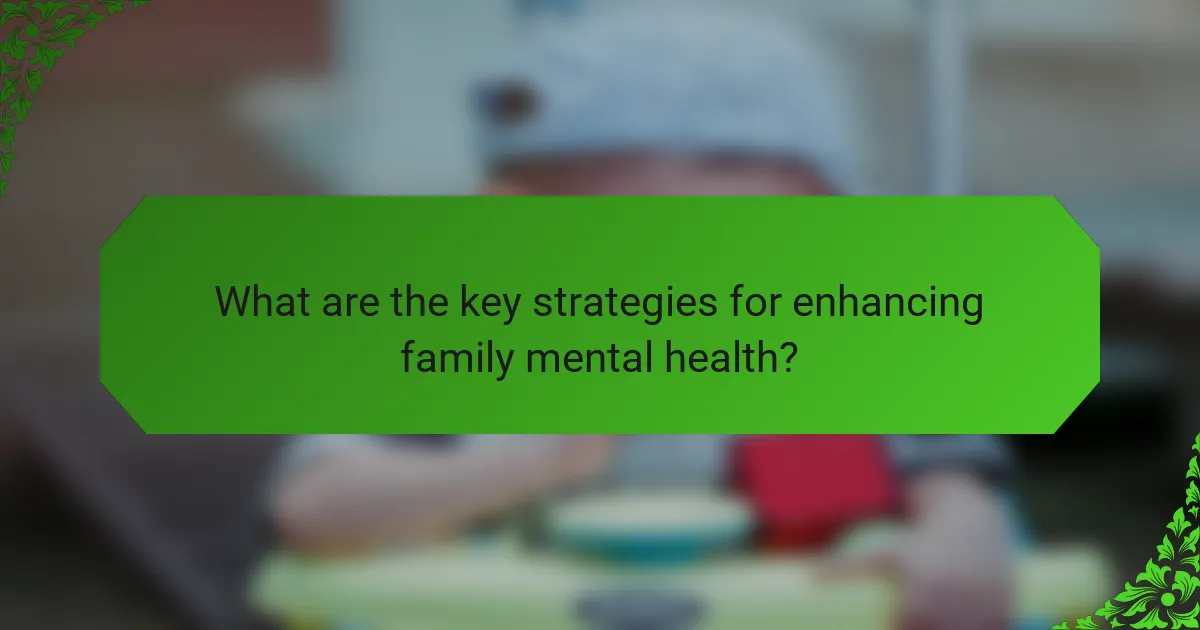
What are the key strategies for enhancing family mental health?
To enhance family mental health, focus on strategies that nurture resilience, connection, and mindfulness. Prioritize open communication, establish routines, and engage in shared activities. Encourage emotional expression and practice mindfulness together to strengthen bonds. Implementing these strategies fosters a supportive environment that promotes holistic wellbeing.
How does resilience impact family dynamics?
Resilience positively influences family dynamics by fostering stronger connections and effective communication. Families that cultivate resilience can better navigate stressors, enhancing emotional support and understanding among members. This leads to improved mental health outcomes, as resilient families demonstrate adaptability in challenging situations. Research shows that resilient families often engage in open dialogues, which promotes a sense of security and belonging. Additionally, resilience encourages problem-solving skills, enabling families to face adversities collectively, thus reinforcing their bond.
What role does connection play in family mental wellbeing?
Connection plays a vital role in family mental wellbeing by fostering emotional support and resilience. Strong family bonds enhance coping mechanisms during stress, promote open communication, and create a safe environment for sharing feelings. Research indicates that families with high connection levels experience lower rates of anxiety and depression. Additionally, mindfulness practices within families can strengthen these connections, leading to improved overall mental health.
How can mindfulness practices benefit families?
Mindfulness practices can significantly enhance family dynamics by fostering resilience and connection. These practices promote emotional regulation, reduce stress, and improve communication. Families that engage in mindfulness report stronger bonds and a greater sense of support. Research indicates that regular mindfulness activities can lead to a 30% increase in overall family satisfaction. Integrating mindfulness into daily routines cultivates a positive environment, encouraging open discussions and emotional awareness among family members.
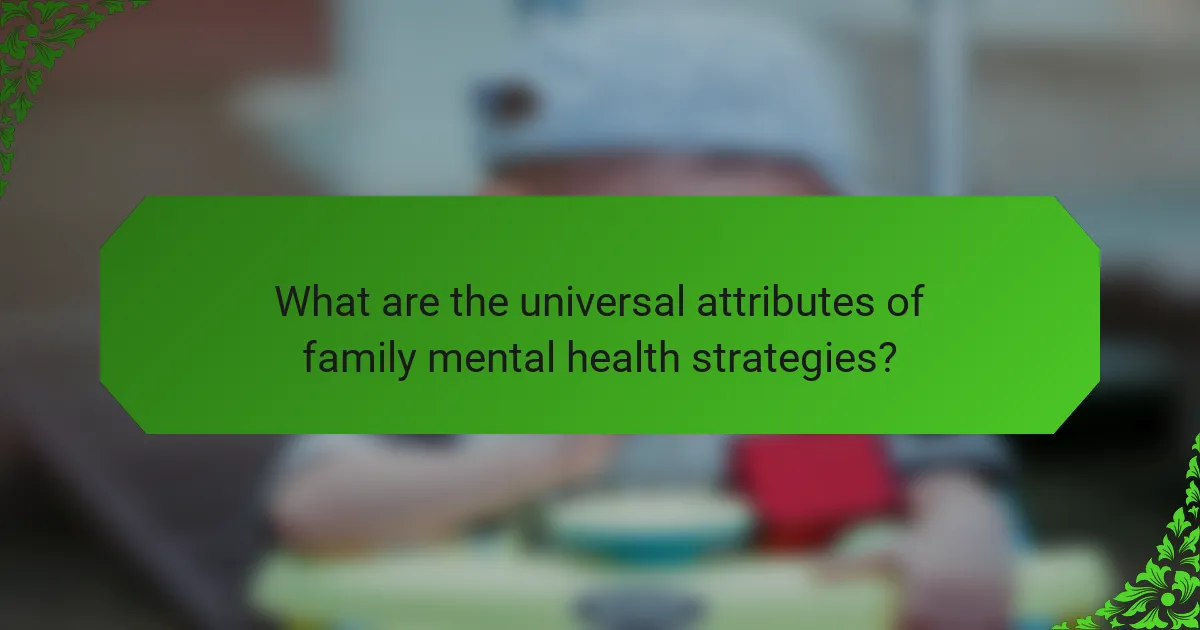
What are the universal attributes of family mental health strategies?
Family mental health strategies focus on resilience, connection, and mindfulness. Universal attributes include open communication, emotional support, shared activities, education on mental health, and promoting a positive environment. These elements foster a nurturing atmosphere that enhances family wellbeing. Engaging in regular check-ins can strengthen relationships and address issues proactively. Mindfulness practices, such as meditation or family bonding exercises, contribute to emotional regulation and stress reduction.
What are the core components of resilience-building activities?
Resilience-building activities focus on enhancing mental health through connection, mindfulness, and support. Core components include fostering open communication, promoting emotional awareness, and encouraging problem-solving skills. Engaging in family activities strengthens bonds and builds trust. Mindfulness practices, such as meditation and deep breathing, enhance emotional regulation. Regular check-ins and shared experiences create a supportive environment, essential for nurturing resilience in family dynamics.
How can effective communication improve family connections?
Effective communication enhances family connections by fostering understanding and empathy. It promotes open dialogue, allowing family members to express feelings and resolve conflicts. Active listening is crucial, as it validates emotions and strengthens relationships. Regular family meetings can further enhance communication, creating a safe space for sharing thoughts. Studies show that families who communicate effectively report higher levels of satisfaction and emotional well-being.
What mindfulness techniques are suitable for families?
Mindfulness techniques suitable for families include activities that promote connection and emotional resilience. Practices such as family meditation, mindful walking, and gratitude journaling enhance collective wellbeing. Engaging in these techniques fosters open communication and strengthens family bonds. Additionally, incorporating breathing exercises can help manage stress levels, creating a calm environment. Regularly practicing these techniques contributes to a supportive family atmosphere, essential for holistic mental health.
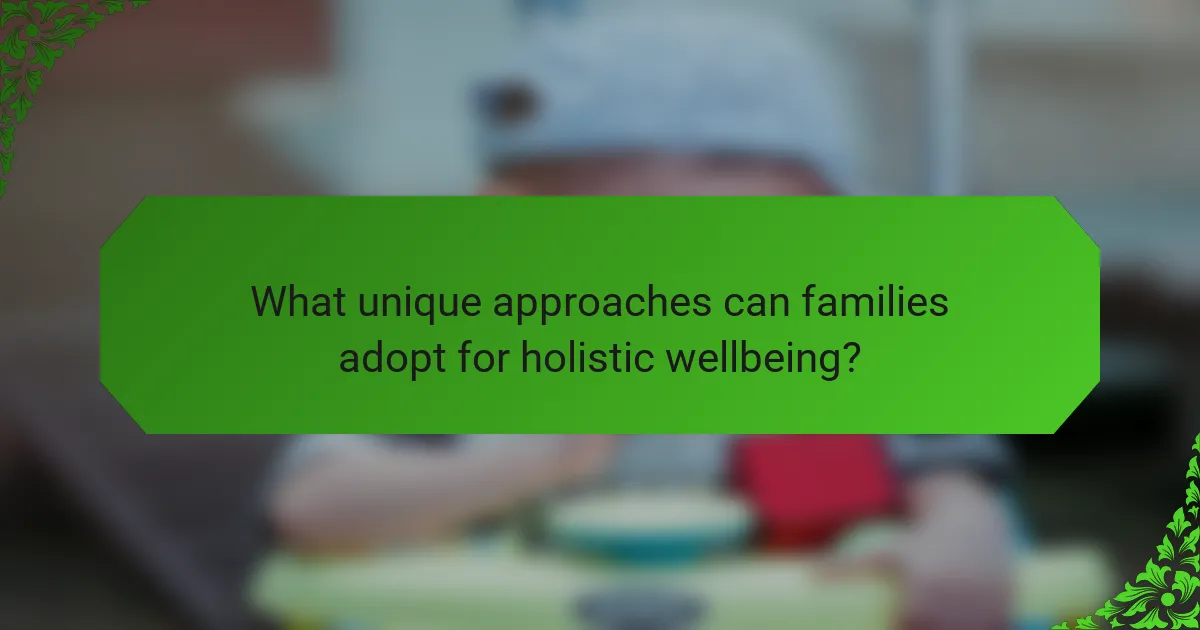
What unique approaches can families adopt for holistic wellbeing?
Families can adopt unique approaches for holistic wellbeing by integrating resilience-building activities, fostering deep connections, and practicing mindfulness. Engaging in regular family discussions about emotions nurtures resilience. Shared activities like cooking or outdoor adventures strengthen connections. Mindfulness practices, such as meditation or yoga, promote mental clarity and emotional balance. These strategies collectively enhance family mental health, creating a supportive environment for all members.
What are creative ways to foster resilience in children?
Engaging children in creative activities fosters resilience by enhancing problem-solving skills and emotional regulation. Techniques include art therapy, storytelling, and outdoor adventures. Art therapy allows children to express feelings visually, promoting emotional processing. Storytelling encourages imagination and coping strategies through character experiences. Outdoor adventures build teamwork and adaptability, essential for resilience. Each method nurtures connection, mindfulness, and holistic wellbeing, vital for family mental health.
How can families create a culture of emotional openness?
Families can create a culture of emotional openness by fostering regular communication and trust. Encourage family members to express feelings without judgment. Establish routines for sharing thoughts, such as family meetings or check-ins. Promote active listening, where each person feels heard and valued. Use mindfulness practices, like meditation, to enhance emotional awareness and connection. This approach nurtures resilience and strengthens family bonds, contributing to overall mental health.
What unique mindfulness exercises can be tailored for family settings?
Mindfulness exercises tailored for family settings can enhance connection and resilience. One unique exercise is the “Gratitude Circle,” where family members take turns expressing gratitude for each other. Another is “Mindful Cooking,” where families prepare a meal together, focusing on the sensory experience of ingredients. “Nature Walks” encourage mindfulness through observation, discussing thoughts and feelings inspired by the environment. Lastly, “Family Meditation” sessions can be customized with themes that resonate with family values, fostering a shared sense of peace and connection.
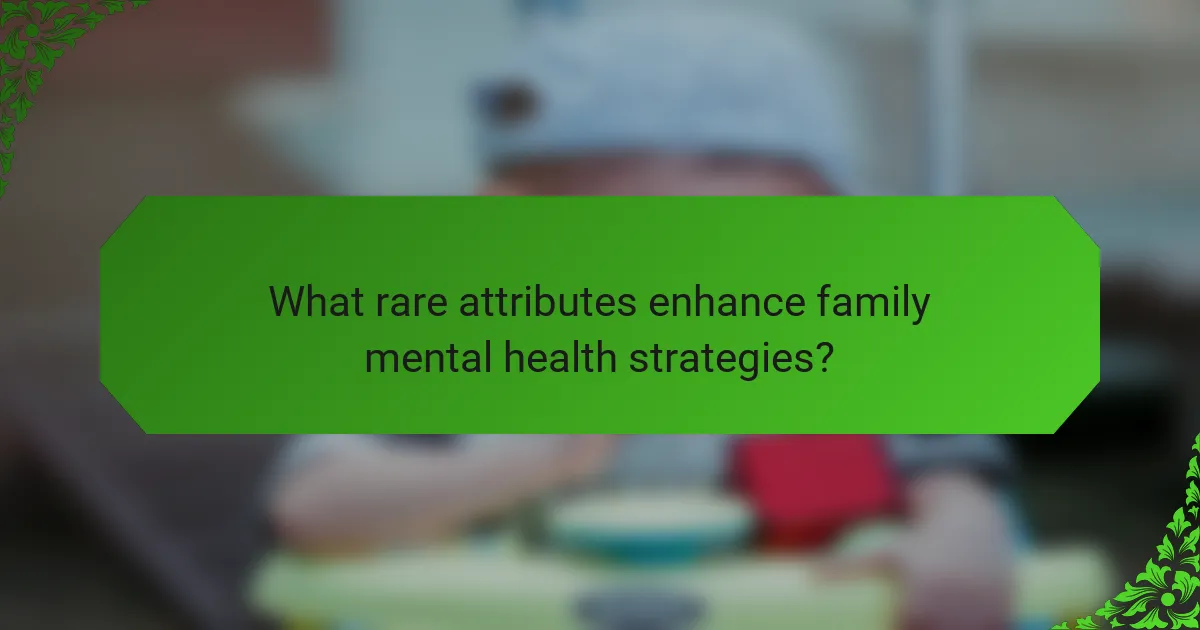
What rare attributes enhance family mental health strategies?
Rare attributes that enhance family mental health strategies include intergenerational communication, shared mindfulness practices, and community engagement. These elements foster deeper connections and resilience within families. For instance, engaging in activities that promote open dialogue across generations can strengthen emotional bonds. Additionally, practicing mindfulness together can improve collective stress management. Community involvement provides external support networks, which are vital for holistic wellbeing.
How can storytelling be used as a tool for connection?
Storytelling fosters connection by creating shared experiences and emotional resonance. It enhances empathy, allowing family members to relate to each other’s feelings and perspectives. This practice nurtures resilience by providing a safe space for discussing challenges and triumphs. Additionally, storytelling can be a mindfulness tool, encouraging presence and active listening, which strengthens familial bonds. By integrating storytelling into family mental health strategies, families can cultivate deeper connections and holistic wellbeing.
What unconventional practices promote mindfulness in family life?
Engaging in unconventional practices like family storytelling, nature immersion, and shared artistic activities can significantly enhance mindfulness in family life. These activities foster deeper connections and encourage present-moment awareness. Family storytelling cultivates emotional resilience by sharing experiences and lessons. Nature immersion promotes relaxation and reduces stress, enhancing overall mental health. Artistic activities, such as painting or music, allow families to express emotions creatively, strengthening bonds and promoting mindfulness together.
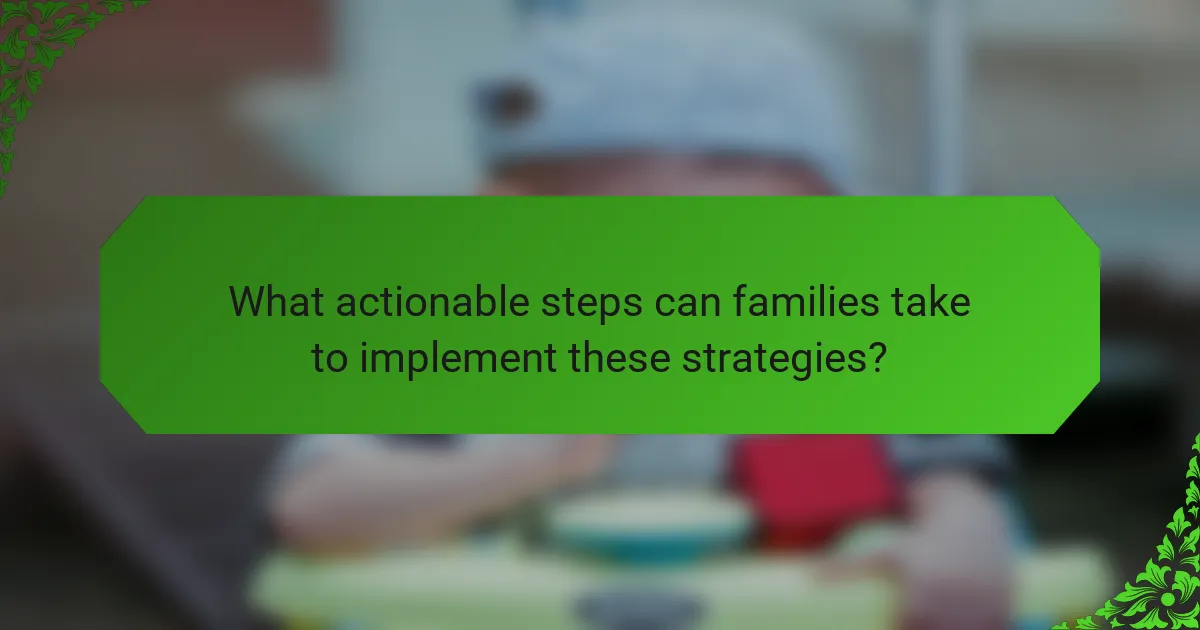
What actionable steps can families take to implement these strategies?
Families can implement mental health strategies by fostering open communication, establishing routines, and practicing mindfulness together. Prioritize regular family meetings to discuss emotions and challenges. Create a structured daily schedule that includes time for relaxation and activities. Engage in mindfulness exercises, such as meditation or yoga, to enhance emotional resilience. Encourage supportive relationships by participating in community activities or family bonding experiences. Track progress and celebrate small achievements to reinforce positive behaviors.
What common mistakes should families avoid in mental health practices?
Families should avoid common mistakes such as neglecting communication, dismissing emotions, and failing to prioritize self-care. Open dialogue fosters connection, while acknowledging feelings enhances emotional intelligence. Prioritizing mental health routines, including mindfulness practices, builds resilience. Establishing boundaries prevents burnout and promotes a healthier family dynamic.
How can families measure the effectiveness of their mental health strategies?
Families can measure the effectiveness of their mental health strategies by tracking emotional well-being, communication quality, and resilience levels. Regularly assessing these areas helps identify improvements or needed adjustments. Implementing tools like surveys, family discussions, and mindfulness practices can provide valuable insights into each member’s mental health status. Engaging in these evaluations fosters a deeper connection and understanding within the family unit, enhancing overall holistic well-being.
What are expert insights on nurturing resilience and connection?
Expert insights emphasize the importance of fostering resilience and connection within families for enhanced mental health. Strategies include open communication, shared activities, and mindfulness practices. These approaches strengthen emotional bonds and promote coping skills. Research shows that families who nurture these aspects experience lower stress levels and improved overall wellbeing. Engaging in regular family discussions about feelings can also enhance emotional literacy, further supporting resilience.
